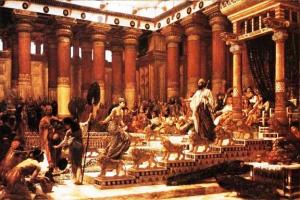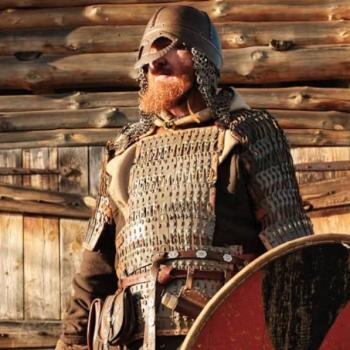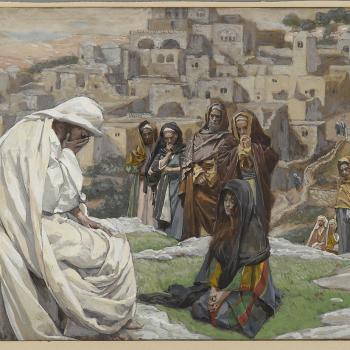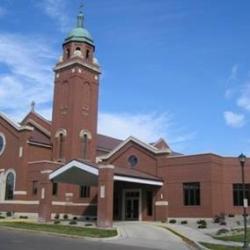
The honor that Israel’s memory paid to King Solomon belies the fact that his kingdom fell apart right after he died. This post enters into the troubled symbol king and thinks about rescuing it as an image for God. Episode 13 of the Rowing with Michael Series: A journey through the Jewish/Christian Scriptures in Verse and Commentary. Introduction and Contents for this series HERE.
Michael, row the boat ashore. Alleluia….
A far off queen came to see a king. Alleluia.
Was Solomon’s wisdom the real thing? Alleluia.
He had enough gold for ninety-nine lives, Alleluia.
And too darned many girlfriends and wives. Alleluia.
After David Solomon is Israel’s best-loved king. That’s in Israel’s later memory, but you have to wonder about Solomon himself. What was Solomon’s reign like, and what happened after he died?
The Bible records that Israel became rather large and powerful under Solomon, although it’s hard to verify that archaeologically. Solomon was king for anywhere from 20 to 40 years. (The Bible says David and Solomon each reigned for 40 years, but we have to be suspicious. 40 is a symbolic number signifying completeness, and it could be more symbolic than real.) Solomon is justly famous for the glorious temple he had built.
Two trajectories, both down
Solomon’s kingdom quickly fell apart after he died in 931. That’s a clue to some problems with the way Solomon reigned. An incident following Solomon’s death tells us more:
All Israel was about to proclaim Solomon’s son Rehoboam king, but first they wanted to know if Rehoboam would lighten the “heavy yoke” that Solomon had put on them. (You can imagine that the temple and an even larger royal palace cost quite a bit and Solomon wasn’t going to pay for it himself.) Rehoboam consulted first the elders and then his young companions. The elders advised accommodation, but the youngsters spoke this way:
This is what you must say to the people who have asked you to lighten the yoke your father put on them: ‘My little finger is thicker than my father’s body. Whereas my father put a heavy yoke on you, I will make it heavier. My father beat you with whips, but I will beat you with scorpions.’
Unfortunately Rehoboam listened to his young friends, and the kingdom split in two. It was replaced by what is known as the “Divided Kingdom.” Israel in the North had 10 tribes. Judah, comprising the tribes Judah and Benjamin in the South. (1 Kings 12:1-16)
The trajectory of these two kingdoms, mostly downward, came to an end eventually. The larger Israel was conquered by the Assyrians (in stages from 740-722). Judah survived until the Babylonian Captivity in 586.
Most of their kings, in spite of the warnings of prophets, were not much different from kings anywhere else. It makes one wonder how God may have felt about getting saddled with the image of king. Jesus called God Father and not king, as far as we know. But he did talk much about a kingdom of God.
We use the image of king for God still, even though kings are as irrelevant today as they were often evil in days past. Still something about the Feast of Christ the King each November gives me a thrill. I always think I can’t be a king no matter how hard I try. You have to be royalty from the start or not at all. Then I think God has made us all kings and queens without our deserving it—and that from the very beginning.
Entering the symbol king
When the Bible gives us a symbol, it asks us to enter into that symbol. Entering into the Old Testament symbol king doesn’t take much imagination for even moderately well-off Americans. We live pretty much like kings of old. I belong to that group, and I propose that we wealthy ones imagine ourselves as kings and queens and see what we have made of this image of God. The Bible will help us look at ourselves:
- We’ve slaughtered our neighbor’s only lamb, which he had cared for lovingly as his own daughter, rather than take one from our own vast herds. That’s how the prophet Nathan described David’s sin with Uriah’s wife. (2 Samuel, 11, 12)
- In this country we’ve coddled the rich and skimped on programs for the poor.
- We’ve slaughtered whole cities—men, women, old, and young—in our campaign to conquer the indigenous peoples of Palestine. That’s the way the Book of Joshua imagines the Israelite’s invasion of the Promised Land. Joshua’s campaign is more story than history, but story is what moves succeeding history, as our history proves.
- In our day we’ve followed Joshua’s example perfectly, pushing the native tribes of this land and their cultures to the brink of extinction.
- We harassed strangers in our land, though we had prophets reminding us that once we were strangers in a strange land.
- Today, though we are descendants of immigrants, we disparage, mistreat, and deport people fleeing to our land.
- We’ve cut down the Cedars of Lebanon to trade for gold and build temples and palaces.
- Now we abuse land, sea, and air in our greed and believe technology will spare us the consequences.
- We’ve allocated to each according to their ability to take, ignoring the rights of the poor, minorities, women, the unborn, and entire future generations. We’ve allowed the more successful of the takers to call it private property, and justice is all about preserving what we’ve thus gained.
The Bible’s revolution
We’ve done all that. If we were only presidents, a heavenly court would have impeached us by now. But God has made us kings and queens. We can’t stop being what God made us, but we can refurbish this tarnished image of God.
When Jesus announced, “The Kingdom of God is upon you,” he added, “Repent, change your minds.” A mind change about what kingship is would be a revolution. Jesus said those who want to be rulers must be servants and last of all. We could be like the Bible’s first rulers—the sun and the moon. God made the sun to govern the day, and that orb selflessly adds his splendor to the day’s beauty. For a governor of night God appointed the moon, who sees the twinkling stars and rejoices at a beauty that is other than her own.
That’s an image of kingship that we can embrace, and it makes a true enough image of God.
Image credit: Women in the Bible











